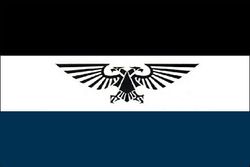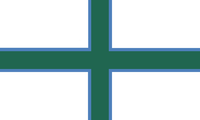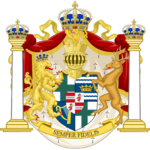Tsardom of Nolland
Tsardom of Nolland | |
|---|---|
| Motto: Semper Fidelis | |
 | |
| Capital | Hastings |
| Official languages | English |
| Demonym(s) | Nollander or Nollandish |
| Government | Constitutional monarchy with an active monarch |
• Tsar | Thomas I |
• First Minister | Ricardo Mendes |
| Legislature | House of Deputies |
| Establishment | July 2nd 2012 |
| Currency | Pound sterling (GBP) |
| Time zone | GMT |
The Tsardom of Nolland (sometimes referred to simply as Nolland, or among older speakers Knolland) is a self-declared "pluricontinental sovereign state", having territory in both Europe and North America. It is most commonly referred to, however, as a micronation. Nolland's main territorial claims, referred to as "metropolitan Nolland", are located almost exclusively in the area of Tyne and Wear, and are enclaves of the United Kingdom. Nolland was officially established in July 2012, though it has a pre-history dating back to late 2011.
Nolland is a constitutional monarchy with a parliamentary and constituency-based system of government heavily influenced by that of the United Kingdom and the Commonwealth realms. Nolland is a democratic nation with an active political scene, involving multiple parties both formed earlier in Nolland's existence and more recently. Nolland's capital is the municipal area of Hastings, where the Tsar resides and the main functions of government take place. Nolland is an English-speaking nation, and it considers itself to be a part of the Anglosphere.
Nolland is diplomatically active within the micronational community, though its allegiances and affiliations have shifted over time. Nolland originally had close relations with Pavlov, but later moved into the sphere of nations that later formed the Confederate States of Prosperity and the Würtige Empire. In recent times, Nolland has become one of the more experienced nations in the community, taking a proactive role in engaging newer micronations in diplomacy.
Etymology
The present name of "Nolland" is an evolution of "Knolland", which the nation was originally referred to as. Knolland, in turn, is an evolution of "Knoll Island", as the first incarnation of the Nollandish state was named. It is believed that this original name originates from the so-called "Grassy Knoll theory" regarding the assasination of John F. Kennedy of which the young founders of the original Nollandish state had a considerable fascination for. There is, however, an opposing view point among many students of Nollandish history that the name originates from the hilled and rugged terrain of the Wear-side area where the bulk of metropolitan Nolland's territorial claims are located. Many Nollandish nationalist groups propagate this viewpoint, regarding the idea that Nolland's name derives from an obscure theory regarding a US President's assasination as humiliating and insulting.
The prefix to the name of the Nollandish name largely remained static for most of early Nollandish history, that being the "Kingdom of" or briefly "High Kingdom of". However, after the transition to Theodorism the state's new name became the "Tsardom of Nolland", which it remained even after the fall of the Theodorist regime. The prefix "Tsardom" literally means "land ruled by a Tsar", with the term "Tsar" being a monarchical title used in many Slavic nations, being derived from the Latin title "Caesar."
History
Pre-history
Formation

The modern Nollandish state originates from the "Empire of Knoll Island", which was founded on July 2, 2012. The original Empire was founded by a number of Sunderland-based school children, and was originally intended as a hobby. The bulk of the work on the initial Nollandish state was done by Thomas Cassidy, who was crowned Emperor and became de facto absolute monarch. In the Empire's initial months he largely ruled by decree, as there was as of yet no codified constitution.
Development
The initial month of so of steady state-building was followed by the so-called "development period" where Nolland underwent a dramatic expansion of activity after joining the MicroWiki community, then located at its .org.uk domain. This period is generally recognised as having begun in early August 2012.
One of the most significant changes which occurred in Nolland during this era was the created by decree of the Knollish Senate, which became the Empire's official legislature, although its power were limited to mainly advising the Emperor. This new legislative body took the form of a Skype Chat Room, consisting of micronationalists such as James R. Frisch, Leon Williamson, Jack Baines, Richard Cunningham and Markus II of Freedonia, all of which would be recognised as some of the most important figures of this era. Further political development occurred with the creation of the post of Prime Minister, which was devolved significant powers by the Emperor. Leon Williamson was appointed as the first Nollandish Prime Minister on August 21, 2012, and concurrently with this action the Emperor created a number of Cabinet posts, with Mark II becoming Minister for the Interior and James R. Frisch being appointed Minister for Foreign Affairs.

This Imperial-appointed government was, however, short-lived. Williamson placed pressure on the Emperor to make the Senate an elected body, but this was opposed by many in the Senate. As a compromise, the Senate remained appointed by the Emperor but the position of Prime Minister was subject to election by popular vote. Williamson immediately declared his candidacy for the election, and was backed by the newly formed Green Party, which espoused environmentalist and socialist principles. The opposition coalesced around A. Tarquitius Buteo and his "Dharma Party", which advocated basing the new Nollandish nation's identity off that of the Mughal Empire. Buteo received the reluctant support of moderates and conservatives frightened by Williamson's socialist rhetoric. The election was highly contentious, with the two candidates engaging in verbal repartee frequently. Williamson referred to the Dharma Party's ideals as "militant and aggressive", whilst describing Buteo personally as a "hooligan." Buteo retorted by labelling the Greens as "bullies" who were "fundamentally evil."
The pre-election battle ended, however, when Buteo inexplicably pulled out of the election the day before the polls opened, leaving Williamson to assume the premiership without opposition. Williamson chose to take a step back from his more radical ideals and kept the Cabinet as it was with the exception of appointing Jack Baines as his Deputy Prime Minister, in addition to adopting a more conciliatory tone towards the monarchy.
Green governance and the October Crisis
During his term as PM, Williamson pursued some of his more moderate left-wing reforms, as well as a number of environmentalist policies. His tenure would however come to an end prematurely, as he tendered his resignation on October 12, 2012. Williamson apparently believed he'd done all he could to better the nation, though many believed that he resigned out of frustration at his inability to pass more radical reforms to curtail the Emperor's power. His resignation would lead to the chain of events which became known as the "October Crisis", which is viewed retrospectively as a great embarrassment by most Nollanders.
After Williamson's unexpected resignation, his Deputy Prime Minister Jack Baines gained royal approval and was appointed PM on a preliminary basis. A snap election was called to legitimise his position, which he won handedly, with the opposition not being able to put forward a candidate due to division within their own ranks. Baines officially became PM in his own right on October 17, 2012, and his initial action was a minor reshuffling of the Cabinet, including the unorthodox step of allowing Emperor Thomas to become Minister for Foreign Affairs. However, four days later he was removed from his post by the Senate on the shaky grounds of "inactivity". With the nation lacking a head of government after Baines' controversial removal, Emperor Thomas invited Williamson back to assume the post, as he was the only one able to command the confidence of the Senate. Williamson reluctantly acceded to the Emperor's request, and re-assumed his previous post on October 21, a mere 9 days after his initial resignation.
However, Williamson had no desire to maintain the premiership on a permanent basis. This, coupled with building opposition within the Green Party itself, led him to once more present his resignation to the Emperor, allowing his Deputy PM Richard Cunningham to assume office. This, however, led to the infamous events of the so called "October Crisis", with Cunningham leaving the Green Party immediately after acceding to the premiership in order to form his own political faction. This raised the ire of many Senators, however, as there was a strong precedent in Nollandish politics of the office being linked to the political party rather than an individual. The opposition of these Senators forced Cunningham to resign on the very same day he acceded to office.
Post-Green era
In the wake of the events of the October Crisis, Emperor Thomas chose not to appoint a Prime Minister in a provisional capacity but to rule in conjunction with the Senate until a new election could be undertaken. The Senate approved a plan by the Emperor to reform the Nollandish electoral system during this short interregnum. The unusual system of having the Senate appointed and the Prime Minister elected separately by popular vote was abolished in favour of a more logical constituency-based system. The Senate became a fully elected body, and the position of Prime Minister became directly tied to the Senate with the leader of the political faction able to obtain a majority of the Senate's seats being appointed PM by the Emperor.
The new election took place on October 26, 2012, and resulted in Arthur Lobão, leader of the new Liberal Socialist party and a Würtige-Nollander, taking the post of PM. However, in order to command a majority in the Senate Lobão had to enter a confidence and supply agreement with numerous independents including Deniz of Pavlov, noted Senator for "The Park" constituency, and James R. Frisch. Both of these independents were guaranteed minor Cabinet posts as part of the agreement. This election was significant not only for the new leadership and electoral system, but also because it saw the final disintegration of the Green Party, with the events of the October Crisis having totally discredited it the eyes of the public. Former Prime Minister Williamson remained in Nollandish politics, however, becoming the Senate Speaker.
Despite a number of successes, Lobão's term as PM would ultimately end infamously as infamously as his predecessor's. He, along with Speaker Williamson, were removed from their positions after word reached the Emperor that they were planning to force through legislation to curb the powers of the monarchy. This action outraged conservative Senators and large portions of the public when it was leaked, giving the Emperor and his supporters the leverage they required to remove Lobão and Williamson from their offices. In addition, the surge of pro-monarchy sentiment in the wake of the attempted legislative putsch allowed the Emperor to permanently dissolve the Senate and institute his vision of a non-partisan political system. To this end, he used his still existing power of decree to turn Nolland into an absolute monarchy, with an advisory council including pro-monarchists such as Mark II and Richard Cunningham, who made his political comeback in the wake of the crisis. The Emperor would eventually recreate the Senate, but its power was curbed and it was a wholly non-partisan body.
Würtige period

A highly significant change which occurred in late December 2012 was the formation of the Würtige Empire with Nolland as a member. Whilst the St. Peter's Republic and the Technocratic Empire of Würtigeland (the founder of the Empire), both of which Nolland had close relations with, immediately joined the new state, Nolland held a plebiscite to before formally obtaining membership. During the lead up to the plebiscite, Richard Cunningham and Mark II clashed, arguing for an against the Empire respectively. This resulted in Mark II being controversially tried in the Würtige Imperial Court for treason for crimes committed during the vote. Another significant event which occurred during this period was the absorption of Agnorr as a county. Additionally, Nolland abandoned any pretence of being an empire in favour of becoming a "high kingdom."
Adopting Theodorism
After the conclusion of the main Würtige period, Nolland began a slow transition towards Theodorism. This transition occurred for a multitude of reasons, but mainly it was a result of a surge of left-wing sentiment in the wake of Mark II's trial. While more radical left-wing ideologies such as Stalinism and Marxism-Leninism were generally frowned upon, Theodorism and its pro-monarch and pro-socialist ideology found fertile ground in Nolland, even among elements of the Imperial family itself and high-ranking members of the government. The Theodorist period is generally recognised as having begun on February 2, 2013, when Nolland officially transitioned into its present status as a Tsardom. Shortly thereafter, Nolland adopted an official Theodorist constitution, largely based on Justinian and Orthodox Theodorist principles.

Despite the official endorsement and initial popularity, however, Theodorism began to slowly lose its appeal to many among the Nollandish populace. The controversial nature of Theodorism itself and the heavily divided opinion about the ideology within the micronational community damaged Nolland's standing diplomatically, which raised the ire of many anti-Theodorists. Initial opposition to Theodorism rallied around the radical nationalist Nollandish Fascist Front, which experienced a groundswell of support in the face of the perceived incompetence and lack of patriotism from the pro-Theodorist National Monarchists, who largely dominated the government during this period. The effectiveness of the anti-Theodorist movement was, however, impeded by a number of factors. Firstly, the traditionally moderate Nollandish people were unsettled by their more radical rhetoric and ideology. Furthermore, the movement itself became divided when former Dharma Party leader A. Tarquitius Buteo broke his support for the NFF and founded his own party, the Nollandish Identitarian Front. The Identitarians quickly became notorious as one of the most radical right-wing groups in the micronational community.
Largely, it was mutual fear of the Identitarians that led to a limited rapprochement between the NFF and the National Monarchists, in addition to the fact that both sides thought they could win the upcoming general election in November 2013. Ultimately, the National Monarchists would achieve their desired majority, gaining six seats in comparison to the NFF's 3 seats. Despite this apparent endorsement from the population, key element within the party itself began to grow tired of the Theodorist system, which had proven divisive and largely ineffective. Consequently, the party used its parliamentary majority to move the country to a more moderate position, largely abandoning Theodorism by the end of 2013.
Post-Theodorism era
With the slow death of Theodorism in Nolland towards the end of 2013, Nolland entered its "Post-Theodorism era." This era was typified by increased political development, but also by territorial expansion and a drastic increase in Nolland's diplomatic presence within the micronational community. Throughout the first half of 2014, however, Nolland's development was largely static, with the Emperor focusing on internal development and refining the existing political system. Nonetheless, there were some important developments, namely the Tsar assuming direct responsibility for Culture and Education in the Grand Unified Micronational by taking a Secretary role shortly after Jacob Lewis' resignation, having been appointed by the Quorum.
Nolland's largely introvert state came to an end when the Tsar contested the June 2014 GUM elections for the position of Supreme Judge. Whilst he was ultimately defeated by Taeglan I, the election marked the first time a Nollander contested for one of the main three positions in the GUM. Furthermore, the Kingdom of Archmidian joined Nolland as a "state" around this time, giving Nolland an additional presence in North America. Another important event during this period was the successful election of Tsar Thomas to the position of GUM Culture Secretary in December 2014, marking the first instance of a Nollander being elected to a staff position in that organisation.
In February 2015, the State of Agnorr petitioned the Federal government to secede and a referendum was held in which the Agnorrian populace voted in favour of leaving Nolland. An act was passed by the Nollandish Parliament allowing Agnorr to leave Nolland. Two months later, in April, Nolland itself held a referendum and exited the Wuertige Empire.
Nollandish National Revival
After a period of executive and legislative inactivity, Tsar Thomas appointed a new Nollandish Cabinet and implemented a new Constitution. Nolland's territories retained Hastings, Oldville and Kothellond while expanding to incorporate new lands such as Carewville.
Geography
Main Article: Nollandish Subdivisions
Administrative divisions
The 2018 Nollandish Constitution outlines four types of basic administrative divisions:
- Cities, reserved exclusively for the Capital City
- Towns, all other inhabited bottom level divisions
- Territories, most other uninhabited bottom level divisions
- Overseas Territories, a specially designated territory (usually far from other Nollandish administrative divisions)
| Flag | Name | Population | County | Duchy | Region | Key Figures | ||||||
|---|---|---|---|---|---|---|---|---|---|---|---|---|
| Cities | ||||||||||||
| Hastings | 4 | |||||||||||
| Towns | ||||||||||||
| Belle Vue | 5 | Morgannwg | Molevan | Gliseland | ||||||||
| Fletchers Hills | 5 | Morgannwg | Molevan | Gliseland | ||||||||
| Hoppers Rest | 5 | Morgannwg | Molevan | Gliseland | ||||||||
| Lebriska | 3 | Briskshire | Zortika | Gliseland | ||||||||
| Carewville | 3 | Carew | Crutton | Maerly | ||||||||
| Oldville | 1 | New Perth | Strathallan | Kothellond | ||||||||
| Territories | ||||||||||||
| Cynefin Lake | 0 | Morgannwg | Molevan | Gliseland | ||||||||
| Hoppers Rest | 0 | Morgannwg | Molevan | Gliseland | ||||||||
| Tennington Fields | 0 | Carew | Crutton | Maerly | ||||||||
| Kothellond National Park | 0 | Kothellond | ||||||||||
| Overseas Territories | ||||||||||||
| Nova Belém | 0 | |||||||||||
Government and Politics
Nolland is a constitutional monarchy with a federal political structure. It is consistently rated a highly democratic nation, and its Westminister-style parliamentary structure has been refined consistently since the initial inception of the Nollandish Senate in mid-2012. Nolland has an uncodified constitution, although it did have a codified constitution during the Theodorist period. As a result of this, the legislature can amend Nolland's constitutional structure simply by passing a regular Act of Parliament, though there is a precedent of highly important or irregular acts requiring the approval of the monarchy in order to be passed.
The two most powerful branches of government in Nolland are without a doubt the Monarchy and the Congress, which is also sometimes referred to as the Parliament. Whilst this legislative body is theoretically invested with the bulk of the Tsardom's political power, it is closely tied to the Monarch and the reigning Tsar plays an active role in its proceedings. The tradition of a politically neutral monarch present in many Westminister-style governments is not present in Nollandish politics, though generally Tsar Thomas has avoided affiliating with any single political faction.
Elections and Political Parties
Throughout its history, the party politics of Nolland have frequently shifted. This is especially true for Nolland's early years, with the frequent creation and dissolution of parties. The first parties to emerge in Nolland were the Green and Dharma parties, both of which contested the first Nollandish election. The Dharma Party's existence, however, would prove brief. This led to a period of dominance of the Green Party in the months before October 2012, with the Senate being composed entirely of the Greens and a number of independents. Again, this period of Nollandish party politics would prove brief. In the wake of the October Crisis, new political factions such as the Liberal Socialists emerged, and the Green Party suffered a slow decline in popularity.
The Liberal Socialists would too have their brief period of political power, before they too eventually lost it after the removal of Lobão. In the wake of his removal, Nolland transitioned to a wholly non-partisan system of government, a status quo which would hold for some time. Ultimately, however, party politics would re-emerge after the transition to Theodorism. In the volatile political climate of this era, radical nationalist movements like the Nollandish Fascist Front and the even more radical Nollandish Identitarian Front would gain significant support, although they were kept out of power by the pro-Theodorist National Monarchist Party. In the post-Theodorist era, party politics again declined in significance with a number of independent legislators arising to prominence. However, there are no restrictions on the creation of political parties and there exists a possibility of a party-based political system re-emerging.
Elections in Nolland are presently conducted a constituency-based system, heavily influenced by that of the United Kingdom. Like the United Kingdom, Nolland also uses first past the post as its voting system, though this is not without controversy among supporters of alternative voting methods. This system was first enacted by the the then-Emperor just before the beginning of Lobão's term as PM, and though it has been subject to certain revisions over time the electoral system has largely remained the same since then.
Government
Current Cabinet
Ministries
Foreign Affairs
Main Article: Foreign Affairs of Nolland
Historic
Nolland's diplomatic alignments within the micronational community has changed greatly over the course of its existence. In the immediate aftermath of its inception and its first involvements in the diplomatic interactions within the MicroWiki community, Nolland generally associated with a group of newer micronations, including the New Nevadan Republic and Pavlov. This remained the established status quo for the original months of Nolland's history, through the period of Green political dominance. However, Nolland would eventually relinquish its political independence by joining as a member state of the Confederate States of Prosperity, a micronational confederation formed by a number of newer micronationalists, including long-time ally New Nevada. This marked a new phase both in Nollandish history and in its foreign affairs, namely because it relinquished its full capacity to conduct its own foreign affairs, delegating that responsibility to the Confederacy's federal government.
This would remain the established status quo in regards to Nolland's foreign affairs for some time, even after the CSP transitioned into the Würtige Empire. Nolland would not regain its full independence pertaining to foreign policy until its eventual secession from the Empire. Initially, Nolland's newly independent foreign policy was not entirely clear in direction, with Nolland mainly focusing on fulfilling the duties of its membership in the Grand Unified Micronational and establishing good relations with the still existential Würtige Empire and its member states like Mercia and the Beaconite Empire.
With the formation of the Nollandish Confederacy by Nolland and a number of newer micronations, Nollandish diplomacy entered an entirely new phase. With the descent of "Old Guard" nations like St.Charlie into inactivity, Nolland became a somewhat senior nation within the MicroWiki community. After the appointment of the second government of James R. Frisch, former Nollandish First Minister Leon Williamson assumed the position of Cabinet Secretary of Foreign and Confederal Affairs. He instituted what he labelled the "New Diplomatic Policy" which entailed pro-actively engaging younger micronations in diplomacy and instituting a lenient admissions policy for the Confederacy. Additionally, under his tenure Nolland signed treaties of mutual recognition with Lundenwic and Leylandiistan, expanding upon the already existential treaty with Juclandia.
Current
Military
Law and Order
Culture
This section is empty. You can help by adding to it. |
Languages and Media
This section is empty. You can help by adding to it. |
National Symbols
This section is empty. You can help by adding to it. |

